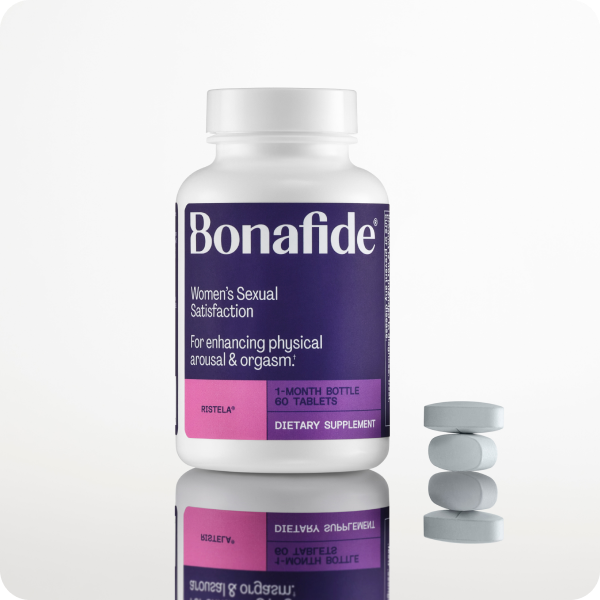Want to print this article for later? Click here.
The female orgasm is an enticing topic, and without question, one that piques every woman’s interest. But weak orgasms or lack of orgasm, lower libido and lack of sexual desire, especially during menopause, can seemingly come out of nowhere, causing concern and frustration.
If you’re suddenly finding it harder to achieve orgasm or have noticed your orgasm is weaker than it used to be, rest assured there’s usually an explanation. Here’s what you need to know about weak orgasms, and what you can do to orgasm better.
What is a Female Orgasm?
Before we talk about what causes weak female orgasms, let’s talk about what the female orgasm is and what happens when women orgasm, in general. If you ask Google, a female orgasm is “a climax of sexual excitement, characterized by feelings of pleasure centered in the genitals.” Physiologically, the genitals become engorged with blood, the heart rate soars, genital muscles contract, and oxytocin and dopamine are released by the brain.
In short, a good orgasm feels fabulous.
The clitoris is central to the female orgasm. Don’t be fooled: the clitoris isn’t just the tiny structure you see externally. It’s actually quite extensive with crura, or legs, which extend well into the labia. Other fun facts? The clitoris houses more than 8,000 nerve endings so, it’s super sensitive! It has erectile tissue, similar to the penis in a man, and becomes engorged and erect with stimulation. It’s no wonder that most women need direct clitoral stimulation to achieve orgasm. In fact, more than 70% of women will not achieve orgasm from intercourse alone.
What Causes Weak Female Orgasms, and How Can You Have a Better Orgasm?
The cause behind weaker or nonexistent female orgasms isn’t always crystal clear, but there are some things you can do and keep in mind to help improve the situation, and potentially have a better orgasm:
- Be present. Surely, you’re not going to reach orgasm if you’re stressed about what happened at work today or everything you need to get done tomorrow. To have a good orgasm and potentially improve your libido, it’s vital to put that busy mind to rest and be in the moment.
- Optimize your lifestyle for sex. A healthy diet means a healthy heart and a healthy weight. I recommend the heart healthy Mediterranean diet as a lifestyle. Smoking interferes with blood flow, including to the genitals. Just don’t smoke. Alcohol is ok in moderation. Exercise is beneficial; if biking or spin class is your thing, adjust your seat and handlebars to avoid numbness to the vulva. Nerve compression around the vulva can definitely influence female orgasm potential.
- Address any underlying medical issues. Hypertension, cardiovascular disease and diabetes, if left untreated, can negatively influence blood flow, including to the genitals. Less blood to the genitals means less sexual satisfaction; it may even suppress the female climax and libido, impact weak orgasms, or lessen sexual desire. Remember to manage chronic medical issues.
- As hormone changes occur during menopause, so might the female orgasm experience. What used to feel like a thunderstorm might seem like a light drizzle now, and that can be a frustrating change. Occasionally, lack of adequate lubrication is the issue. You can ensure vaginal moisture and lubrication with foreplay, or you can look to your favorite lube or vaginal moisturizer for a little help.
Here are some additional tips from Bonafide Chief Medical Officer, Dr. Alyssa Dweck:
Some women prefer to use topical, vaginal estrogen to supplement their own decline of hormones, and that’s ok too. I also recommend that women use certain sex toys to enhance stimulation, more specifically a vibrator. Vibration can help to enhance blood flow and female orgasm…consider it the doctor’s orders!
You may also want to consider more natural options for supporting female orgasm, including the incorporation of specific dietary supplements into your daily routine. One option for addressing weak orgasm is French maritime pine bark extract, which is a natural plant extract known for being rich in nutrients that are anti-inflammatory and antioxidants. In addition to those pro-health properties, researchers have found that French maritime pine bark extract can help increase blood flow, which can aid in making the female orgasm experience better.
The Benefits of Orgasming
The health benefits of sex and orgasm have been demonstrated over and over again. Orgasms feel great, relieve stress, help with sleep, burn calories, strengthen pelvic floor muscles and provide a general sense of well-being.
True, at times the stars may need to be aligned to achieve orgasm… but a little help with the tips above certainly can’t hurt!












Comments
Post commentI’ve got metastatic breast cancer that went to my brain. My body has been through a number of “wars” and I thought my sex life was over. My oncologist recommended Relizen for my hot flashes. It took about 4 months for them to calm down. Now several years later, I rarely have them! I also started using Ristella which has given me my life back! Along with Reveree, I’m a happy woman again! Thank you so much for what you do to help women like me!
I just want to thank every woman for sharing! I’m 67 and have had Mona Lisa’s, Dysport Shots ( yep there) and various topicals. I’m sad to lose this part of my life. I’m now looking for the next thing to make intercourse easier, enjoyable and doable. Mother Nature gives women a bad rap! If we were men, we would have a pill or something. Here’s to Woman Menopause Power!!!
I have taken Ristela for a few months and it really does work. I’m 44 and haven’t had much of a libido in a while due to burnout and I also just found out my hormones are really low, most likely a combo of my age and the burnout. However Ristela has helped a lot. Not just with the libido part but also my ability to orgasm is out of this world. My internal sensitivity is also different. I hope this supplement is never discontinued. I brought it to my doctor who now helps me with hormone support and she was very impressed and is now recommending it to her patients (and taking it herself).
I am 49 and recently have a total hysterotomy. Before the procedure I had a regular cycle, had normal orgasms and a very active sexual life. After the procedure everything changed and I did not want my husband to touch me, I felt like my body was dead. My GYN recommended this produce and I ordered it. I am patiently awaiting on it. Meanwhile I am welcoming the reviews from those of you who have tried it and taking in all the advise I can find. I will be posting an update once I start it.
Have using for a few months great stuff